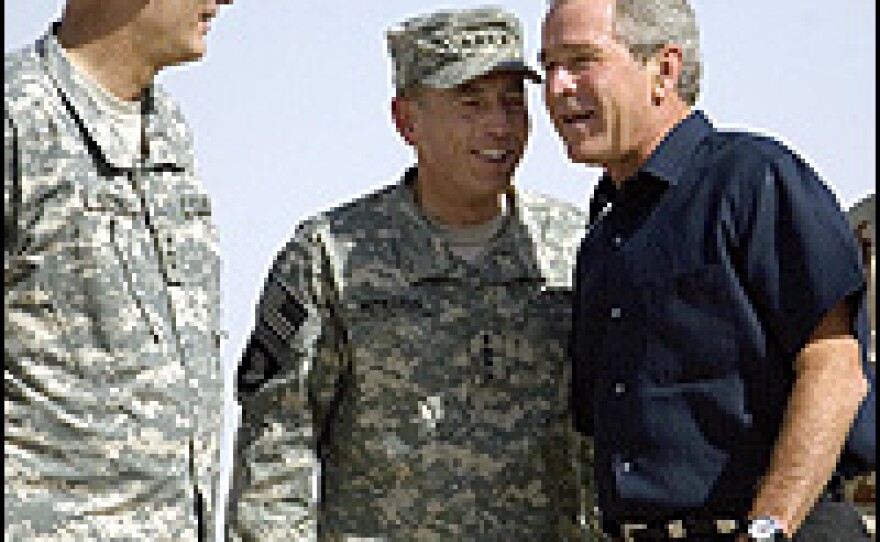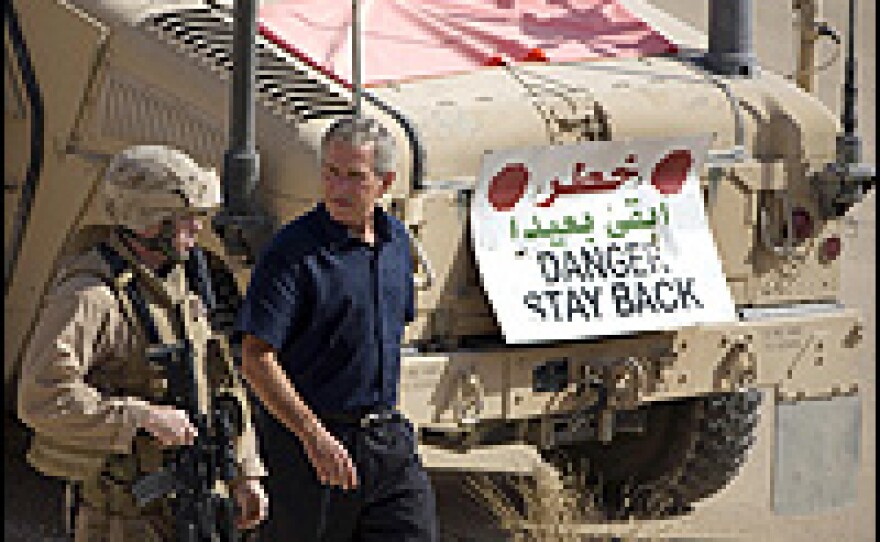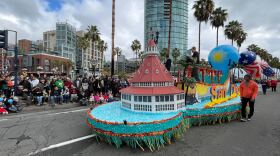
President Bush and his national security team made a first-hand assessment of the war in Iraq and prospects for political reconciliation Monday before a showdown with Congress over the U.S. troop buildup.
The president secretly flew 12 hours to this dusty air base in a remote part of Anbar province, bypassing Baghdad in a symbolic expression of impatience with political paralysis in the nation's capital. The gesture underscored the U.S. belief that the spark for progress may come at the local level.
Defense Secretary Robert Gates arrived ahead of Bush and conferred with senior U.S. officials, including Gen. David Petraeus and Ambassador Ryan Crocker, before a session with Prime Minister Nouri al-Maliki, President Jalal Talabani, and other top Iraqi officials from Baghdad.
To a large degree, the setting was the message: Bringing al-Maliki, a Shiite, to the heart of mostly Sunni Anbar province was intended to show the administration's war critics that the beleaguered Iraqi leader is capable of reaching out to Sunnis, who ran the country for years under Saddam Hussein.
The temperature topped 110 degrees as Bush stepped off Air Force One. The president stopped at a small building where a Marine Cobra pilot briefed him about the positives and negatives of current troop rotations. He told the president that troops were not getting enough time at home and did not have enough time for training.
"Morale?" asked Bush. "How's morale?"
"Very high sir," the pilot, Capt. Lee Hemming, said.
Bush's six-hour stay was being confined to Al-Asad Air Base, an airfield once part of Saddam Hussein's military.
National Security Adviser Stephen Hadley said the trip was conceived about six weeks ago when top White House advisers began discussing Bush's role as Congress returns to Washington and debate over the war heats up. It was decided that progress in Anbar made it the perfect place to showcase the administration's strategy.
There has been a drop in violence in Anbar, where Sunni tribal leaders and former insurgents have teamed up with U.S. troops to hunt down al-Qaida and other extremists.
Anticipating criticism that Bush's trip was a media event to buttress support for his war strategy, the White House was ready to push back.
"There are some people who might try to deride this trip as a photo opportunity," White House deputy press secretary Dana Perino said. "We wholeheartedly disagree."
Hadley said Bush wanted to hear personally from commanders and from al-Maliki himself.
"There is no substitute for sitting down, looking him in the eye, and having a conversation with him," Hadley said. "The president felt this is something he had to do in order to put himself in a position to make some important decisions."
Next week, Petraeus, the top U.S. commander in Iraq, and Crocker testify before Congress. Their assessment of the conflict, along with a progress report the White House must give lawmakers by Sept. 15, will determine the next chapter of the war.
Indications are that the president intends to stick with his current approach — at least into 2008 — despite pressure from the Democratic-led Congress and some prominent Republicans. Right now, the White House is working to keep Republican members of Congress in the president's fold to prevent Democrats from amassing the strength to slash war funds or mandate immediate troop withdrawals.
The United States cannot sustain the troop buildup indefinitely. And with Democrats calling for withdrawals and a rising U.S. death toll that has topped 3,700, the president is hardpressed to give al-Maliki's government much more time to find a political solution to the fighting.
Bush stopped in Iraq ahead of his visit to Australia for an economic summit with Asia-Pacific leaders. The trip was a closely held secret for obvious security reasons, although speculation about the trip arose late last month when first lady Laura Bush said she was staying home to tend to a pinched nerve in her neck.
The president, who also went to Iraq at Thanksgiving 2003 and in June 2006, was scheduled to leave for Australia on Monday, but Air Force One took off from Andrews Air Force Base Sunday evening instead.
He was joined by his top advisers, including National Security Adviser Stephen Hadley. Joining Gates were Gen. Peter Pace, chairman of the Joint Chiefs of Staff, and Adm. William Fallon, the top U.S. commander in the Middle East. Fallon flew aboard Gates' Air Force plane from Washington.
Pentagon press secretary Geoff Morrell said the session at al-Asad would be the last big gathering of the president's war advisers with Iraqi leaders before he makes a decision on a way forward in Iraq.
The White House arranged Bush's trip at a pivotal juncture in the Iraq debate. Some prominent GOP lawmakers have broken with Bush on his war strategy, but so far, most Republicans have stood with Bush. In exchange for their loyalty, they want to see substantial progress in Iraq soon.
Critics of the war argue that while the troop buildup may have tamped down violence, the Iraqis are making almost no headway toward political reconciliation. They cite a handful of gloomy progress reports trickling out of Washington that show some success in curbing violence, but little progress toward political power-sharing agreements.
There are now 162,000 U.S. troops in Iraq, including 30,000 that arrived since February as part of Bush's revised strategy to provide security so Iraqi leaders could build a unity government.
Bush met on Friday with his top military chiefs at the Pentagon who expressed concern about a growing strain on American troops and their families from long and often multiple combat tours.
The Associated Press
Copyright 2022 NPR. To see more, visit https://www.npr.org. 9(MDAzMjM2NDYzMDEyMzc1Njk5NjAxNzY3OQ001))






